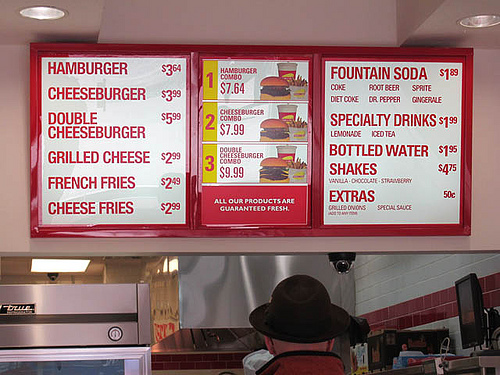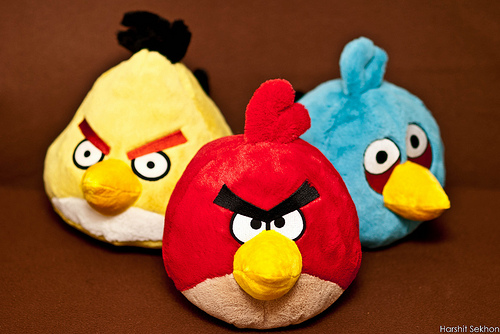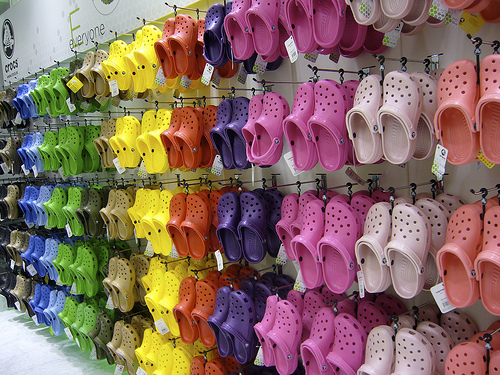Easier is better than better
In his book, The Paradox of Choice (“The Paradox of Choice” by Barry Schwartz), Barry Schwartz comes to an interesting conclusion about how a person makes a choice:
"People choose not based on what is more important, but based on what is easiest to evaluate."
Common sense dictates that of all the options you have to choose the one that is most important to you, although in fact people usually choose the one that is convenient for them, easy to understand. Very often we do this because we do not want to spend time on research, sorting out the issue to make an informed decision. Politicians are rarely elected on the basis of the fact that most people conduct research about their political programs. They are elected because people remembered the message that the politicians circulated, and because they had heard about this policy before.
')
When it comes to developing your own design, we imagine people who will take an informed opinion, based on knowledge, think about what they will do next. However, they have already made about fifty decisions throughout the day, and these decisions, most likely, were more important than what they would do in our project.
Do you think most people understand that using a manual gearbox has an advantage over an automatic? Do you think they care? Automation is easier, so why bother about another choice? How often do we maintain a relationship with a person simply because it is easier for us to get used to the situation than to oppose ourselves, to enter into conflict?
Have you ever been to In 'N Out Burger ? I heard a lot of stories about this place, about their mythical hamburgers and french fries. The point of this place is that they have a very limited menu. You order a double double, cheeseburger or hamburger. You can add french fries, milkshake or drink if you want. That's all the options (unless you know about the secret menu). So, I was there and tried their food, and yes, it is good, but not much different from Wendy. The attraction of the place is that your choice is limited. It's easy to place an order there, because you don't have to decide which kind of chicken sandwich is right for you right now.

Woot.com is not a simple online store, it has its own "zest". Instead of looking through hundreds and thousands of products, you are offered just one product per day. If you like it, you buy it, and if not, wait until tomorrow to see what will be put up the next day. The site is a successful project, despite the fact that the logic seems to tell us the exact opposite. However, if I have a store, is it all the same whether I sell 100 units of the same name or one hundred different units? Woot makes it easy to buy goods, you just need to decide: yes or no.
How much less enjoyable would you get from Angry Birds, if you had to choose the birds to use before each level? By hiding this choice from us and allowing us to focus only on how to use birds, the developers made the gameplay much more enjoyable.

How many of your friends have decided to buy a computer of a certain modification for their home simply because they use exactly the same at work? Since they have exactly the same thing at work, using their home computer becomes much easier for them. This does not mean that such equipment is the best - it’s just that set of devices and programs that is convenient for them. Our choice should not be the best, it just should be clear to us.
How often do you come across sites that offer you better opportunities than their competitors, but they are not so easy to use? There is no reason to switch to a service that is more difficult to use, even if it has more features. If this functionality does not make my life easier, then what good can I find in this service?
Previously, when image hosting was awesome, the best sites provided the ability to download images without the need for registration or authorization. You just downloaded the image, that's all. Imgur is a great example of this, and it has become one of the most popular photo hosting sites in the world. This does not mean that sites like Flickr cannot flourish - no, they just had to work much more in order to reach more users and show that it really makes sense to go through all the troubles of registration.
In a recent article, Jared Spool published a study that showed that only 5% of users changed their MS Word settings. Being a computer geek, I was surprised because I would like to dive into the settings of all my applications to see what I can configure. And yet, the vast majority of people do not seem to want to change the settings - they just want to use applications:
“We have embarked on a small experiment. We asked the people to send us their settings file for Microsoft Word. The fact is that MS Word stores all the settings in a file with a name like config.ini, so we asked people to find this file on the hard disk and send it to us. A few hundred people did.
Then we wrote a program for analyzing files, calculating how many people changed the settings (more than 150 options in total), and what parameters they changed.
We found something really interesting. Less than 5% of the users we polled changed the settings. At that time, as more than 95% left the original settings without changing the configuration in which the program was installed. ”
It's great when developers give the user the ability to make changes to the settings, but the settings themselves are not an essential function. Creating a great product that just works should be a top priority, and as soon as you begin to understand what parameters can be changed, you can think about how to add a settings panel.
Users assume that you give them the settings that suit them best. Otherwise, they may consider your product as a failure.
The paradox of choice says that the more options a person has, the harder it is to make a choice. For example, if junk samples are offered at a store for tasting, you are more likely to force people to buy a jar of jam when only six of the available options are available to choose from than with the twenty-four options. Greater choices do not make it easier for people to choose. At the same time, the lack of choice takes away from them a part of the freedom that they think they have.

When you think which new iPhone you want to buy, you can get it either in black or in white, plus three more different memory options. Add developers a few more options here, and the choice will be a little more difficult.
If a client tells you that you can make him a design that you like more, it will be more difficult than to make a design with limitations, since your possibilities are endless. We need a framework, a limited choice in everything we do. This makes decision making more simple, and the resulting design is easy to use.
If somehow you can make a simple product, and it will be the best product on the market, you are already a winner. You have to think about how often we make choices in one day, and therefore it is in your interest to limit the options of decisions for the user, because this is unlikely to be the most important decision for them today.
This means that the design that is most easily appreciated (fewer choices) will benefit in most cases. Funny T-shirts and bumper stickers are effective because they are understandable. I spend quite a lot of time choosing clothes in the morning — don't make me try to decide which of the 250 standard avatars I should choose.
"People choose not based on what is more important, but based on what is easiest to evaluate."
Common sense dictates that of all the options you have to choose the one that is most important to you, although in fact people usually choose the one that is convenient for them, easy to understand. Very often we do this because we do not want to spend time on research, sorting out the issue to make an informed decision. Politicians are rarely elected on the basis of the fact that most people conduct research about their political programs. They are elected because people remembered the message that the politicians circulated, and because they had heard about this policy before.
')
When it comes to developing your own design, we imagine people who will take an informed opinion, based on knowledge, think about what they will do next. However, they have already made about fifty decisions throughout the day, and these decisions, most likely, were more important than what they would do in our project.
Do you think most people understand that using a manual gearbox has an advantage over an automatic? Do you think they care? Automation is easier, so why bother about another choice? How often do we maintain a relationship with a person simply because it is easier for us to get used to the situation than to oppose ourselves, to enter into conflict?
Have you ever been to In 'N Out Burger ? I heard a lot of stories about this place, about their mythical hamburgers and french fries. The point of this place is that they have a very limited menu. You order a double double, cheeseburger or hamburger. You can add french fries, milkshake or drink if you want. That's all the options (unless you know about the secret menu). So, I was there and tried their food, and yes, it is good, but not much different from Wendy. The attraction of the place is that your choice is limited. It's easy to place an order there, because you don't have to decide which kind of chicken sandwich is right for you right now.

Woot.com is not a simple online store, it has its own "zest". Instead of looking through hundreds and thousands of products, you are offered just one product per day. If you like it, you buy it, and if not, wait until tomorrow to see what will be put up the next day. The site is a successful project, despite the fact that the logic seems to tell us the exact opposite. However, if I have a store, is it all the same whether I sell 100 units of the same name or one hundred different units? Woot makes it easy to buy goods, you just need to decide: yes or no.
How much less enjoyable would you get from Angry Birds, if you had to choose the birds to use before each level? By hiding this choice from us and allowing us to focus only on how to use birds, the developers made the gameplay much more enjoyable.

How many of your friends have decided to buy a computer of a certain modification for their home simply because they use exactly the same at work? Since they have exactly the same thing at work, using their home computer becomes much easier for them. This does not mean that such equipment is the best - it’s just that set of devices and programs that is convenient for them. Our choice should not be the best, it just should be clear to us.
How often do you come across sites that offer you better opportunities than their competitors, but they are not so easy to use? There is no reason to switch to a service that is more difficult to use, even if it has more features. If this functionality does not make my life easier, then what good can I find in this service?
Previously, when image hosting was awesome, the best sites provided the ability to download images without the need for registration or authorization. You just downloaded the image, that's all. Imgur is a great example of this, and it has become one of the most popular photo hosting sites in the world. This does not mean that sites like Flickr cannot flourish - no, they just had to work much more in order to reach more users and show that it really makes sense to go through all the troubles of registration.
User settings and selection
In a recent article, Jared Spool published a study that showed that only 5% of users changed their MS Word settings. Being a computer geek, I was surprised because I would like to dive into the settings of all my applications to see what I can configure. And yet, the vast majority of people do not seem to want to change the settings - they just want to use applications:
“We have embarked on a small experiment. We asked the people to send us their settings file for Microsoft Word. The fact is that MS Word stores all the settings in a file with a name like config.ini, so we asked people to find this file on the hard disk and send it to us. A few hundred people did.
Then we wrote a program for analyzing files, calculating how many people changed the settings (more than 150 options in total), and what parameters they changed.
We found something really interesting. Less than 5% of the users we polled changed the settings. At that time, as more than 95% left the original settings without changing the configuration in which the program was installed. ”
It's great when developers give the user the ability to make changes to the settings, but the settings themselves are not an essential function. Creating a great product that just works should be a top priority, and as soon as you begin to understand what parameters can be changed, you can think about how to add a settings panel.
Users assume that you give them the settings that suit them best. Otherwise, they may consider your product as a failure.
Paradox of choice
The paradox of choice says that the more options a person has, the harder it is to make a choice. For example, if junk samples are offered at a store for tasting, you are more likely to force people to buy a jar of jam when only six of the available options are available to choose from than with the twenty-four options. Greater choices do not make it easier for people to choose. At the same time, the lack of choice takes away from them a part of the freedom that they think they have.

When you think which new iPhone you want to buy, you can get it either in black or in white, plus three more different memory options. Add developers a few more options here, and the choice will be a little more difficult.
If a client tells you that you can make him a design that you like more, it will be more difficult than to make a design with limitations, since your possibilities are endless. We need a framework, a limited choice in everything we do. This makes decision making more simple, and the resulting design is easy to use.
If somehow you can make a simple product, and it will be the best product on the market, you are already a winner. You have to think about how often we make choices in one day, and therefore it is in your interest to limit the options of decisions for the user, because this is unlikely to be the most important decision for them today.
This means that the design that is most easily appreciated (fewer choices) will benefit in most cases. Funny T-shirts and bumper stickers are effective because they are understandable. I spend quite a lot of time choosing clothes in the morning — don't make me try to decide which of the 250 standard avatars I should choose.
Source: https://habr.com/ru/post/133729/
All Articles